A well-functioning immune system is vital to keep you healthy – so which nutrients do you need to keep it in tip-top condition?
🕒 9 min read
Your immune system is made up of billions of cells that patrol the body to protect against disease. Some cells absorb and destroy viruses and bacteria, some produce antibodies, while others make anti-viral substances such as interferon.
To function properly, all immune cells require a steady supply of key vitamins and minerals. Natural substances found in some foods – especially fruit, vegetables, herbs and spices – also have beneficial effects on the immune system.
Unfortunately, National Diet and Nutrition Surveys show that average intakes of some vitamins and minerals are below the EU recommended daily amount. For example, significant numbers of women aged 19-65 years have low intakes of vitamins A, B2, C, D, E and minerals calcium, copper, iron, iodine, magnesium, selenium and zinc.
Here are the vitamins and minerals that can help.
Multivitamins
Older people tend to develop more vitamin and mineral deficiencies due to eating less food and absorbing nutrients less efficiently, which can lead to reduced immunity and higher levels of inflammation.
Recent research from Oregon State University also found that adults aged 55 and over who took a daily multivitamin and mineral supplement for 12 weeks had a significantly better ability to fight off infections than those taking placebo.
If they became unwell, their symptoms were less severe and went away more quickly. This meant that the number of sick days in those taking a multivitamin was less than three, compared to more than six for those not taking them.
It may be beneficial for older people – and others who may be lacking in several essential nutrients – to consider a multivitamin.
"The immune system protects us not just against infection, but against poisons, antigens, pollutants and more. It's highly complex and demands optimum performance from many different organs and cells in the body. Adequately nourishing these cells and enhancing this performance keeps us alive and well, and a broad-spectrum multivitamin goes a long way to achieving this." Dr Hilary Jones
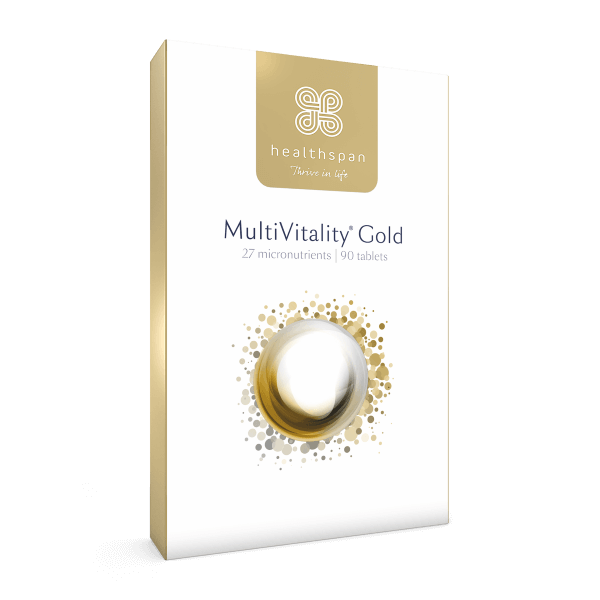
MultiVitality Gold
One-a-day health support
- The whole spectrum of vitamins and minerals in one tablet
- Suitable for vegetarians and vegans
- Protect yourself from nutritional deficiencies for just 10p a day
Vitamin C
Viruses replicate by hijacking our cells and using our own cell 'machinery' to make new viral proteins. Research shows that having good levels of vitamin C seems to suppress the ability of some viruses to make these copies of themselves.
As an antioxidant, vitamin C also helps to neutralise inflammation to reduce symptoms of a viral infection and speed up healing.
Good intakes of vitamin C are particularly important for those under physical stress, in whom studies show that supplements were found to reduce the risk of infection and the severity of cold symptoms.
Vitamin C supplements can also help to reduce asthma attacks associated with respiratory infections – partly through its antiviral action and also by reducing airway sensitivity.
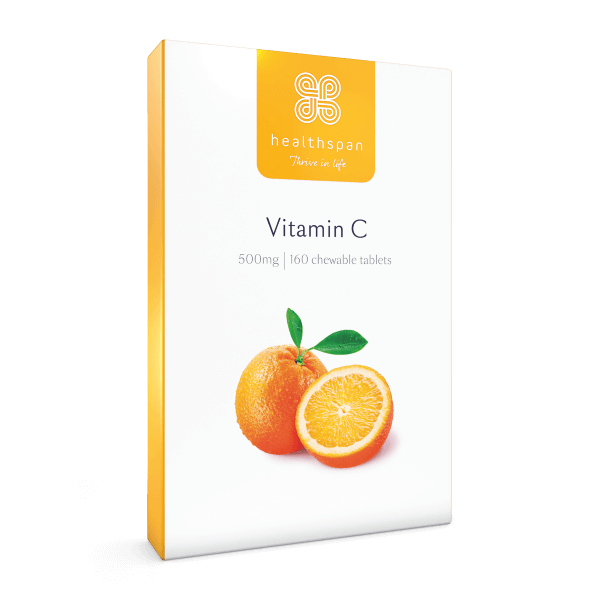
Vitamin C 500mg
Chewable tablets with 500mg vitamin C. Vegan-friendly
- Supports immunity, bones, joints and skin
- Added citrus bioflavonoids to combat free radicals
- Free from aspartame
Vitamin D
Vitamin D is essential for immunity as it interacts with cells that engulf and destroy viruses and bacteria (macrophages), those which make antibodies (B lymphocytes) and those that regulate immune responses (T lymphocytes).
In a study involving 18,883 people aged 12 or older, those with low levels of vitamin D were 36 per cent more likely to develop common cold symptoms than those whose levels were optimal.
Other research confirmed that taking a vitamin D3 supplement reduced the risk of developing a respiratory tract infection (including the common cold, influenza and pneumonia) by a third, compared with placebo.
We can only make vitamin D in our skin on exposure to sunlight when the UV index is greater than three. As a result, vitamin D deficiency is increasingly likely during autumn and winter in northern latitudes such as the UK. The NHS therefore recommend that everyone takes a vitamin D supplement.
"Vitamin D is essential for optimal, reliable immunity, and low levels in our body expose us to a greater risk of colds, coughs, flu, and pneumonia. Many people are deficient in vitamin D especially during the winter months, so supplementation at all ages makes good sense and is highly recommended." Dr Hilary Jones
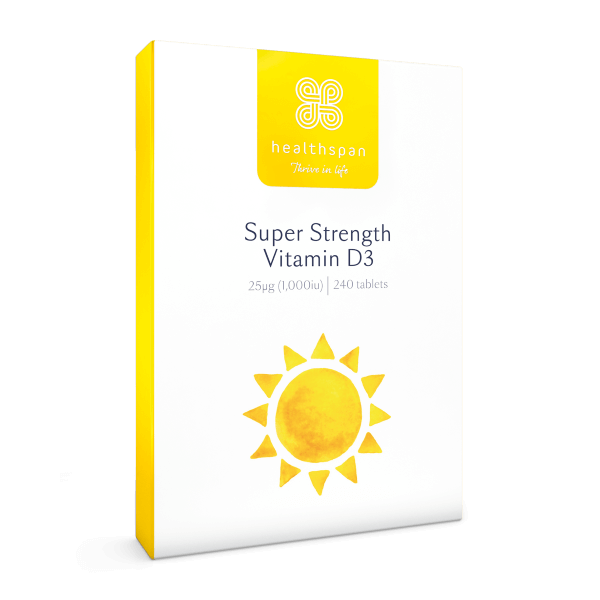
Super Strength Vitamin D3
For healthy bones, teeth, muscles and immunity
- 25µg vitamin D per tablet
- Helps keep bones, teeth and muscles healthy, and supports immunity
- Multiple health benefits from 5p a day
Zinc
Zinc is a popular remedy for sore throats and other symptoms of a common cold. Sucking zinc lozenges inhibits viral replication and activates infection-fighting white blood cells in the throat, which depend on zinc to work properly.
Zinc is also vital for memory T cells, which remember a given infection and patrol the body to mount a rapid response if that particular infection is encountered again.
Research shows that another important role for zinc is in resolving immune responses and inflammation once an infection has been fought off, to avoid prolonging symptoms.
One study showed that, overall, people who use zinc lozenges recover three times faster than those not using them so that, by the fifth day of a cold, 70 per cent of the people taking zinc were fully recovered compared with only 27 per cent of those using placebo.
When it comes to cold sores, zinc can inhibit the replication of herpes simplex viruses by up to 90 per cent.
In a study of people who experienced more than six episodes of recurrent cold sores per year, taking zinc supplements halved the average number of recurrences and reduced the duration of each episode to an average of 5.7 days.
"Zinc activates the white cells in our blood, which fight infection and promote a speedy immune response whenever we encounter certain viruses for a first or second time. Zinc supplements can also help resolve inconvenient, cold symptoms more quickly, and even reduce the frequency of recurrent cold sores." Dr Hilary Jones
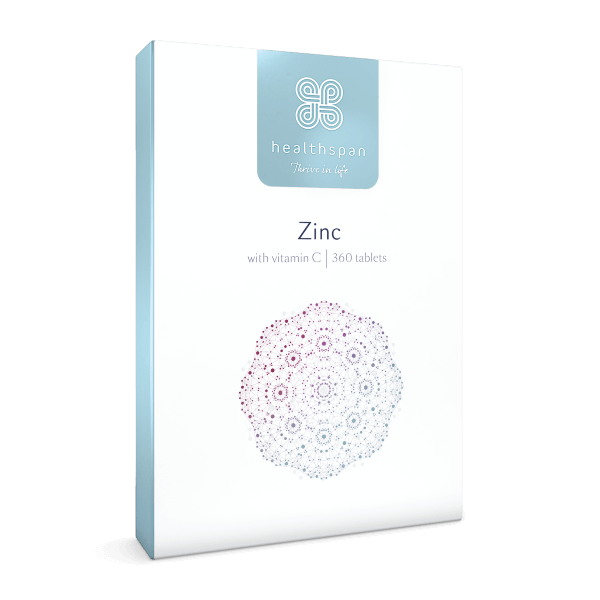
Zinc with Vitamin C
Easily absorbed zinc citrate for immunity, hair, nails, skin and vision
- Zinc citrate for easy absorption
- Supports immunity and multiple other health areas
- Support your health and wellbeing for 3p a day
Echinacea
Echinacea grows in many gardens, where it is known as purple coneflower. It was used by Native American Indians to treat infections and is now a licensed herbal medicine for relieving cold and flu symptoms in the UK.
Negative studies have gained a lot of publicity, but these often use inappropriate preparations. The strongest evidence for effectiveness against viral respiratory infections comes from studies using Echinacea purpurea.
Echinacea contains several unique substances, such as echinacoside, which have antimicrobial actions, and others, such as echinacin B, which damp down inflammation.
Taking the extracts increases the number and activity of white blood cells involved in fighting infections, and has an anti-inflammatory action to reduce symptoms if infection takes hold.
This makes it a popular treatment for respiratory infections such as colds, laryngitis and tonsillitis. It may be taken in a low dose, long-term, to reduce infections, or in a higher dose just when you feel an infection coming on.
When used to prevent a common cold, echinacea almost doubles the length of time between infections compared with those not taking it and, when infections do occur, they tend to be less severe.
The results from 14 studies found that echinacea decreased the odds of developing a cold by 58 per cent and shortened the duration of a cold by 1.4 days. Another analysis of three trials found that taking echinacea reduce the likelihood of a cold by 55 per cent.
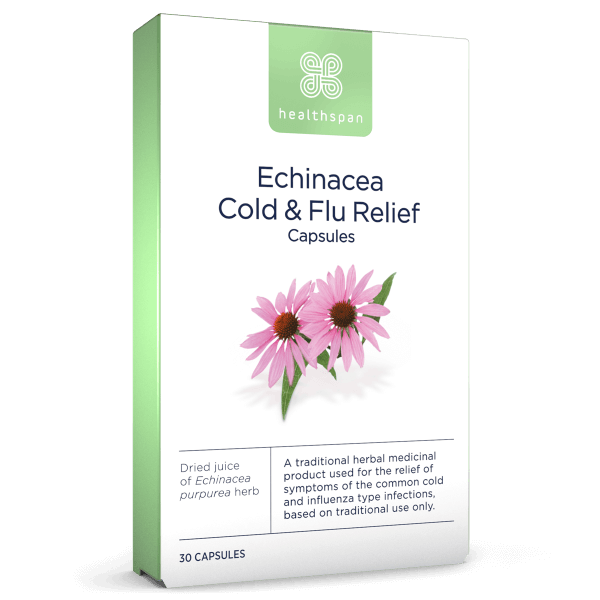
Echinacea Cold & Flu Relief
Provides symptoms relief for the common cold and influenza-type infections
- Registered Traditional Herbal Medicine (THR)
- Traditionally used to relieve cold and flu symptoms
- To be taken at the first sign of a cold
Elderberry
Elderberries were eaten as part of the Neolithic diet and are now used to make elderberry jam, wine or syrups. Their dark purple-black colour is due to an abundance of antioxidant pigments, known as polyphenols, which have powerful antiviral actions.
Elderberry extracts are used medicinally to reduce the severity and duration of colds and flu. This activity is partly due to blocking viruses from entering cells, and partly due to proteins that reduce the ability of viruses, fungi and bacteria from growing.
Recent laboratory studies suggest that elderberry extracts are also active against coronavirus infections.
In a trial involving 60 adults with flu-like symptoms, those taking elderberry extracts were relieved of influenza symptoms, on average, four days earlier than those taking placebo. Levels of antibodies were also significantly higher in those taking elderberry extracts than in those taking placebo.
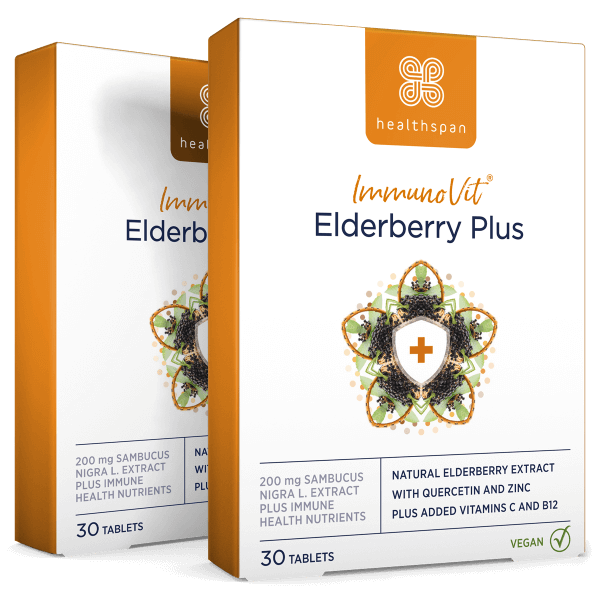
ImmunoVit® Elderberry Plus
200mg black elderberry extract
- Botanical immune health complex
- Supports your immune system
- Added vitamins B12 and C, plus zinc and quercetin
Medicinal mushrooms
Medicinal mushrooms are a rich source of unique substances that support immune function.
Red reishi mushrooms (Ganoderma lucidum) contain at least 100 different substances, known as triterpenes, which have a similar structure to steroid hormones. In laboratory studies, these substances were shown to have antibacterial, anti-viral, antihistamine, anti-allergy and anti-inflammatory properties.
Preclinical studies also found that reishi extracts increase the secretion of antibodies and immune substances within the gut to reduce the risk of gastrointestinal infections.
Shiitake mushrooms (Lentinus edodes) contain a unique mushroom glucan called lentinan, which is believed to boost immune defences against viral and fungal infections.
In Japan, lentinan has been extracted and given by injection as a biological response modifier to treat several medical conditions, including upper respiratory tract problems and conditions involving depressed immune function.
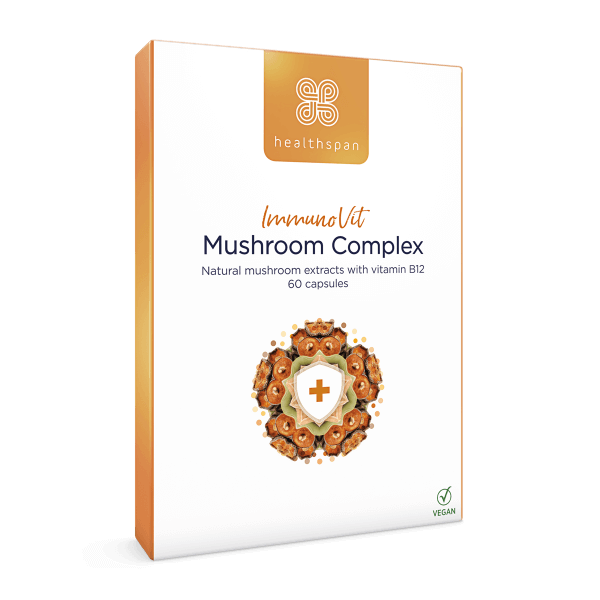
ImmunoVit® Mushroom Complex
300g reishi, maitake and shiitake mushroom extracts
- Supports your immune system
- Natural mushroom blend
- Contains 200% NRV vitamin B12 to aid energy levels
Maitake mushrooms (Grifola frondosa) are a source of vitamin D, but the main immune-boosting effects are believed to come from its beta-glucans.
Research shows that maitake extracts can increase levels of phagocytosis (the process in which immune cells absorb and destroy invaders) and other defence reactions, with the most active extract being a combination of maitake-shiitake.
Probiotics
Probiotics are 'friendly' bacteria found in fermented foods, such as live bio yoghurts, kefir and kimchi, and in probiotic supplements. They aid digestion and have effects on immunity via immune tissues lining the gut.
Strains of Lactobacillus and Bifidobacterium have several actions in the intestines to boost immunity.
As well as maintaining the correct acidity in the gut to prevent harmful bacteria from multiplying, they also produce natural antibiotics and increase production of antiviral substances, such as interferon.
A Cochrane analysis of 12 trials, involving 3,720 children and adults, found that probiotics reduced the chance of experiencing at least one to three acute upper respiratory tract infections by 47 per cent, shortened a cold by 1.89 days, and reduced antibiotic prescription rates by 35 per cent.
"Much of our innate immunity resides in and relies on a healthy gut. Here, friendly bacteria with many other essential functions keep pathogenic viruses and bacteria in check. Many factors encountered in modern life can challenge this delicate balance, so supplemental probiotics can be the cavalry who come to our rescue whenever we need them." Dr Hilary Jones
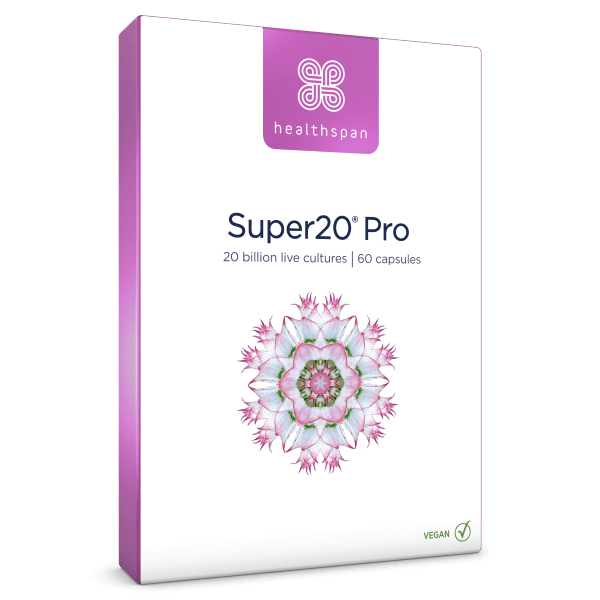
Super20 Pro
Our best-selling probiotic
- 20 billion live cultures from 5 well-researched strains
- Contains Lactobacillus acidophilus, Lactobacillus paracasei, Bifidobacterium lactis and Bifidobacterium bifidum
- Supports the protective intestinal microflora in the gut






